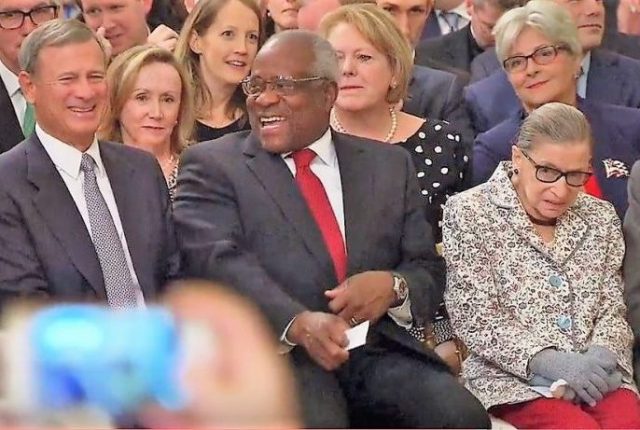Supreme Court rejects challenges to partisan gerrymandering
“partisan gerrymandering claims present political questions beyond the reach of the federal courts”

In one of the major cases of this term, the Supreme Court has refused to provide a role for federal courts in deciding so-called partisan gerrymandering cases. That is, cases in which the federal courts pass judgment on the political process that gave rise to sometimes unfair districts benefitting one party or another.
It was a straight 5-4 conservative-liberal split.
The Opinion by Chief Justice Roberts, joined by Thomas, Alito, Gorsuch and Kavanaugh is here.
Here’s the key conclusion:
Excessive partisanship in districting leads to results that reasonably seem unjust. But the fact that such gerrymandering is “incompatible with democratic principles,” Arizona State Legislature, 576 U. S., at ___ (slip op., at 1), does not mean that the solution lies with the federal judiciary. We conclude that partisan gerrymandering claims present political questions beyond the reach of the federal courts. Federal judges have no license to reallocate political power between the two major political parties, with no plausible grant of authority in the Constitution, and no legal standards to limit and direct their decisions. “[J]udicial action must be governed by standard, by rule,” and must be “principled, rational, and based upon reasoned distinctions” found in the Constitution or laws. Vieth, 541 U. S., at 278, 279 (plurality opinion). Judicial review of partisan gerrymandering does not meet those basic requirements
MORE TO FOLLOW
“What the appellees and dissent seek is an unprecedented expansion of judicial power. We have never struck down a partisan gerrymander as unconstitutional—despite various requests over the past 45 years. The expansion of judicial authority would not be into just any area of controversy, but into one of the most intensely partisan aspects of American political life. That intervention would be unlimited in scope and duration—it would recur over and over again around the country with each new round of districting, for state as well as federal representatives. Consideration of the impact of today’s ruling on democratic principles cannot ignore the effect of the unelected and politically unaccountable branch of the Federal Government assuming such an extraordinary and unprecedented role. See post, at 32–33.
Our conclusion does not condone excessive partisan gerrymandering. Nor does our conclusion condemn complaints about districting to echo into a void. The States, for example, are actively addressing the issue on a number of fronts….
We express no view on any of these pending proposals. We simply note that the avenue for reform established by the Framers, and used by Congress in the past, remains open.”
The lower court cases are to be dismissed for lack of jurisdiction:
The judgments of the United States District Court for the Middle District of North Carolina and the United States District Court for the District of Maryland are vacated, and the cases are remanded with instructions to dismiss for lack of jurisdiction.
This is a sweeping rejection well beyond what would have occurred with a substantive evaluation of partisan gerrymandering. There will be no wiggle room for district court judges to try to get involved somehow. For better or worse, partisan gerrymandering is subject to the partisan political process, not the sometimes seemingly partisan judicial process.
Donations tax deductible
to the full extent allowed by law.








Comments
The left must not have felt as strongly about gerrymandering as they did about the census question, given how Roberts decided.
The Census ruling was where all the political heat was, but in actual fact it changed very little.
THIS was the important decision that changed a LOT.
Democrats prefer to gerrymander districts through [subsidized] immigration reform, but it is not beneath them to use other methods and devices.
Time to get your gerrymander on Republicans!!
What this means to me is that I will never again be represented in congress by someone that I wanted to elect.
when have you ever?
The court rightly punted on this issue.
So, unless and until state politicians implement a benign ‘X Acres squared’ grid upon their respective state geography to establish voting districts, Gerry the Mander will continue to dominate the political power of voting blocs – particularly in urban areas.
Not a lawyer and I’ve never played one on tv but does this lay a groundwork for abortion being a state issue?
Democrats can do what they want now. If the Republicans complain about what looks a lot like racial gerrymandering the Democrats will argue that it was in fact partisan gerrymandering and thus outside the courts purview. I suspect, however, that such a defense will not prove to be usable when the Republicans are the accused.
They were OK with the PA State Supreme Court hijacking the entire process from their legislature though.
Apparently, the Constitutional authority for State Legislatures to draw Congressional Districts actually authorizes the State’s Courts to hire a private individual to draw districts even more gerrymandered to favor Democrats than the districts the Democrats had drawn themselves, prior to the redraw by Republicans.